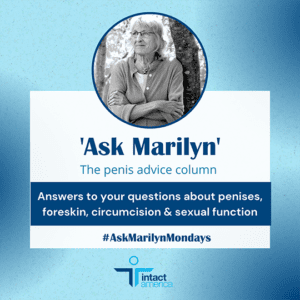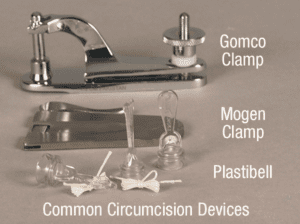 Dear Marilyn: We are expecting a boy in May and plan to circumcise him. Friends tell me that there are many difference devices that can be used. Could you tell me which circumcision device is the safest?
Dear Marilyn: We are expecting a boy in May and plan to circumcise him. Friends tell me that there are many difference devices that can be used. Could you tell me which circumcision device is the safest?
—Cheryl F., New York, NY
Dear Cheryl: Circumcision devices are not safe for any baby. At birth, the foreskin and glans (head of the penis) are connected by a common membrane (the balanopreputial lamina, or synechia). The first step in any circumcision is to insert a probe between the two layers and tear them apart. At this point various clamps and cutting devices are used. All of these devices cause immense pain, put the child at risk of hemorrhaging, infection, and disfigurement of the genitals.
The commonly used Gomco Clamp crushes thousands of nerve endings, various specialized muscles, and many blood vessels in the foreskin with thousands of pounds of pressure.. This intense pressure essentially welds everything together. Even with all that pressure, blood still seeps into the tissue once the clamp is removed, causing a dark ring at the scar site, evidence that a Gomco clamp was used. The clamp comes in many sizes and doctors often use the wrong size, leading to complications.
 Doctors who use the Plasti-Bell circumcision device insert it between the glans and the foreskin. Once in place, the doctor pulls the foreskin over the plastic tube and ties a string around the foreskin. He pulls the string as tight as he can to crush the tissue and ties a knot to hold it in place on the plastic tube. Then he slices off the foreskin. The foreskin under the string dies over the next few days, and then it and the Plasti-Bell fall off. At times, the device gets stuck and this causes new problems that must be dealt with medically. The Plasti-Bell has the highest infection rate following circumcision because of harmful bacteria on the string and decaying flesh.
Doctors who use the Plasti-Bell circumcision device insert it between the glans and the foreskin. Once in place, the doctor pulls the foreskin over the plastic tube and ties a string around the foreskin. He pulls the string as tight as he can to crush the tissue and ties a knot to hold it in place on the plastic tube. Then he slices off the foreskin. The foreskin under the string dies over the next few days, and then it and the Plasti-Bell fall off. At times, the device gets stuck and this causes new problems that must be dealt with medically. The Plasti-Bell has the highest infection rate following circumcision because of harmful bacteria on the string and decaying flesh.
The Mogen Clamp is most often used by ritual circumcisers called mohels. Glans (head of the penis) amputation occurs more frequently with this device. The Mogen Company, now out of business, was sued often. Sadly, there are replicas still being made and still hurting babies.
In short, there is no safe device. The safest way is don’t circumcise! Let him grow up and decide what parts of his own body he does or doesn’t want. He’ll be glad you did!
—Marilyn Milos





